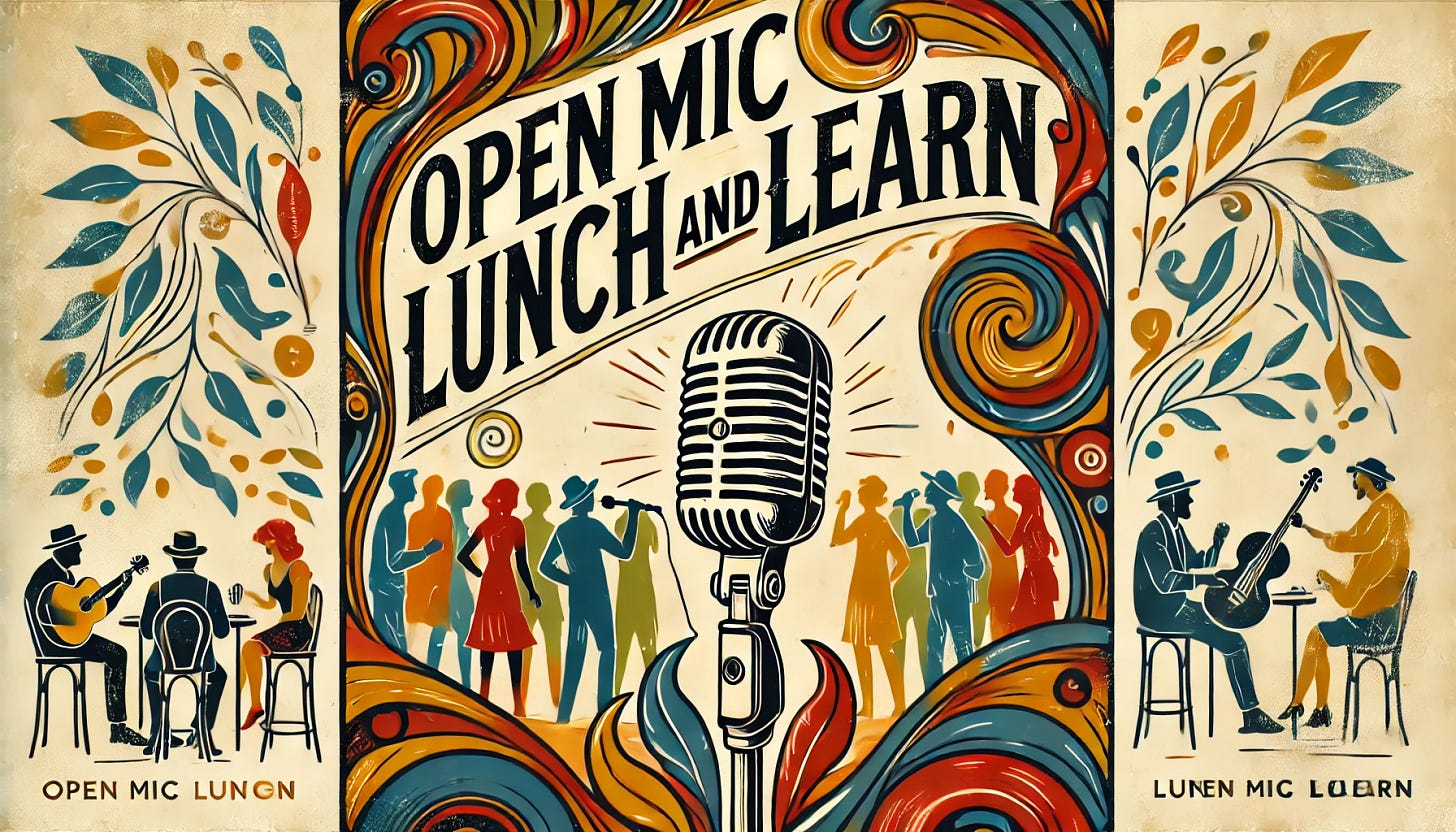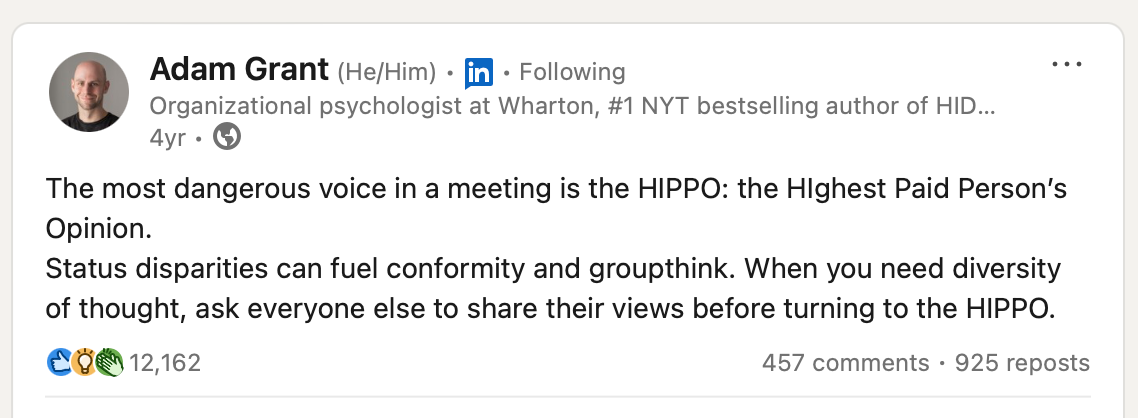Hand over the Clicker!
To build a Human First Fundraising Team we need to lean into what knowledge, experience, and viewpoints make each team member unique and give them a platform (and the PowerPoint clicker).
My team and I just set goals for fiscal year 2025. The goal that excites me most is the one named “Building the Human First Fundraising Team.” This is our professional development goal. It maps out how we build a team of fundraisers by amplifying what makes each individual team member unique, combining that with a laser focus on best practices, high standards of performance, and a commitment to ethical fundraising practices.
There are quite a few tools in this toolbox, some of which I'll write about later, but there is one that I lifted up to the team this week. The Open Mic Lunch and Learn. This year, every member on my team has the opportunity to present on a topic that they deeply care about, consider themself an expert, and think their colleagues need to know about.

Of course, these L&Ls will be ON TOPIC; we stay largely in our wheelhouse of individual giving and fundraising. Lori Arnold, our Director of Transformational Giving, will talk about Matching Gifts, Kelly Comer, Manager of Major Gifts, will talk about the Fundraiser Bill of Rights, and Mike Caldwell, Manager of Estate Gift Planning, will introduce us to the wonderful world of expectancies. Important topics, on which these team members will have a thing or two to say.
My Ulterior Motive is Building a Stronger Team
Although the topics are important, this series does a lot more for this team, and that’s where I think the real magic happens. It allows for every team member to showcase and develop their unique areas of interest and expertise (creating diversity of expertise on our team), learn by teaching (creating better communicators), and have a moment where they are the person whose expertise and opinion matters most in the room (creating importance without “management responsibility”). Allowing everyone to contribute in this way creates the foundation of a team of strong individual team players who know where to go to when they need someone’s input.
Developing Existing Strengths
Much of professional development is about things we do not know yet. Getting formal education in fundraising (like taking classes at The Fundraising School or IU’s Lilly Family School of Philanthropy) is an excellent way to become a better fundraiser. However, these classes focus on what you need to know, not what you already know. Developing strengths in areas you already know quite a bit about is another way to develop professionally. These things can turn what you have learned through years of experience, formal education, and just plainly being interested, into the kind of expertise that can be defined as lines on your resume, LinkedIn bullets, and the things people call you for when they need advice.

Leaders Need to Shut Up Once in a While
I don’t regularly go around quoting Steve Jobs, but when I do it’s definitely a cliché. He is credited for a quote on how you should not hire smart people and tell them what to do, but hire smart people and have them tell you what to do. To accomplish this you have to give your team members a platform to do so, but you also need to not talk yourself.
And for a lot of leaders this is really hard (anyone who knows me how hard it is to make me stop talking). Adam Grant has this great concept of the HIPPO, the Highest Paid Person’s Opinion. Leading a team, you have to watch out for this dynamic also in the realm of sharing knowledge. If you want your team members to thrive, enable them to lead with their own knowledge and expertise. It will lift your whole team up.
But, I’ll Walk the Talk
This is an effort to give my team a platform to share their expertise and develop as fundraising professionals. Just like I too have a portfolio and fundraising goals, I don’t want it to come off as if I am free of responsibility here. I too will present a Lunch and Learn. Mine will be on empathy in fundraisers, something I care a whole lot about.
When I have some data on how this series has gone this year, I’ll post an update. In the next few weeks, I’ll write more reflections on the other tools in the Human First Fundraising Team toolbox, such as “Bring me 1” conversations, and, so far a team favorite, the “Major Gift Forensic Analysis.”
Have a great week,
Maarten
EXTRA CREDIT
Below is an excerpt of an email I sent to my team about choosing a topic and preparing for their lunch and learn.
So… what if your first response here was Oh no, Maarten, what could I possibly talk about in a lunch and learn?!
If you've ever been to an event like Pecha Kucha, Ignite, or TEDx, you know the surprise feeling of excitement when the presenter gets really passionate about their topic. What is most surprising about these events is how often you didn't know ahead of time how much the person really knows about the topic and how much they care about it. There is just so much to know in this world, and in my next email I'll write more about the value of knowing what you want and need to know (ooh, knowing about knowing, how meta!). There seems to not be one way to this level of passion and expertise: The people who present at these events, especially at TED and TEDx events, are experts in their particular topics because they have a singular interest in it, have researched the topic for years, or have deep lived experience.
Here are some great examples of the different ways in which people come to these sorts of presentations:
Brené Brown: The power of vulnerability | TED Talk
Shawn Achor on Happiness at TEDx Bloomington
Serena Wales - How to Win at Bar Trivia (a few choice words in this one)
I think you too are positioned well to take a topic and present on it. If you are concerned about what to present your lunch and learn on, here are a few things I want you to consider:
Don't discount who you are and what you know
Doing an internal lunch and learn provides you with an opportunity to investigate your strengths. Yes, you may have a similar job description as someone else, you may have a similar title, but the reality is that only you have the experiences, history, and personal characteristics that give you unique knowledge and perspectives. Lean into what makes you you and your unique perspective on any topic. This will instantly make your Lunch and Learn valuable to anyone who understands the importance of differing viewpoints.
Lean into your strengths
What do you do well? Are you an ace at developing processes? Are you singularly able to get visits by writing this one weird sentence? Is understanding how new technologies affect our work something you have a knack for? Do you know the cues to look for in people's facial expressions that tell you you've struck a nerve? Are you amazing at writing meaningful contact reports in 100 words or less? Even though we talk about strengths in high level terms a lot, what are more granular things where your particular strengths can be of service to others? Define what it is that you are good at and see how that translates into helping your colleagues be better at their jobs, or to know when to collaborate with you.
Don't overthink it, people need refreshers too
Even IF you feel like you would present on something that others already know, or should know, we need to be reminded sometimes how things work ("Here's how to file a kick-ass contact report"), what the details are ("Matches, how to light a fire under a donor's giving"), and new developments ("The silent DAF revolution").* People are bombarded with information, and it is hard to keep things top of mind. Periodically being reminded of important factors in our work is incredibly helpful, and updates on things that we THINK we know, but understood incorrectly, or where thinking has evolved can make the difference between success and failure.
You'd be surprised what people can be interested in, but know your audience
I like hearing people speak about things they care about, know a lot about, or otherwise share with great passion. Maybe I'm just a learner at heart. Also, like anyone else, I have seen presentations that made me want to gauge out my eyeballs from boredom. BUT, if something is presented with passion and an understanding who is listening, regardless of the topic I think most people would be happy to learn.
Trust yourself
Trust that you know your stuff. That's it.
And then there are fringe benefits. Here are a couple benefits of doing this you might not think of:
Sometimes you learn by teaching (what?! mind blown). This happened to me while writing this email! Often, when you're forced to think about a topic and have to explain it to others, you develop new insights. The ACT of preparing to teach something can bring clarity and order to your thoughts. So, instead of the only benefit being OTHER people learning from you, you have a chance to learn from YOURSELF.
And, much like practicing the ask so your smooth as silk when asking a donor, this is great practice to talk about something you care about, while not being in a high-stakes environment. It allows you to train for when you do need to make a case, present a topic, explain a mission, or make proposal. This practice, with something you know deeply, is enormously helpful in knowing how you act in such an environment and be ready.
*these are all fake titles, but take one if you need one!
